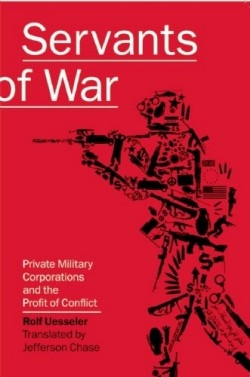Servants of War
Private Military Corporations and the Profit of Conflict
Private Military Corporations (PMCs) is the sanitized name for the mercenary armed forces that play strong and dangerous roles in wars throughout the world. Often these hired armies, when combined with the large number of support staff accompanying them, outnumber the armed forces of their employer nations. But there is a serious difference between mercenaries and enlisted men: instead of fighting for nation or ideology, PMCs fight for profit.
The author, a native of Dortmund, Germany, is a freelance writer who has lived in Rome since 1979, and has written two previous books, Mafia, Myth, Power, Mora (1987) and Challenge Mafia: Strategies Against Organized Crime (1993), both focusing on Uesseler’s specialties, organized crime and illegal economic activities. He has published widely in German and Italian peri-odicals and gained first-hand experience by participating in the Italian anti-Mafia movement.
Private Military Corporations are much more than armed forces of mercenaries, they are among the world’s wealthiest corpo-rations. PMCs such as Blackwater Worldwide and Kellogg, Brown and Root (KB&R) offer a wide array of services that include secu-rity, training, intelligence, and logistics. KB&R, a subsidiary of the oil and gas equipment corporation Halliburton Energy Services until 2007, received $13 billion in contracts in 2005 alone for its services in the Iraq War. The author claims that Vice President Richard Che-ney, Halliburton’s former CEO, made millions from its gross overcharges of the U.S. government. Blackwater, on the other hand, bills U.S. taxpayers $445,891 a year for each of its employees compared to the $51,100-$69,350 that is paid to each member of the U.S. military. Blackwater’s fortune came from providing security in Afghanistan and Iraq, but has been notorious for terrorizing the local population.
Despite the spin, PMCs do not provide cost effective services, the author maintains. Mediocre service at exorbitant cost is the rule. In addition, since PMC members are private employees, they are allowed to operate with little oversight and infrequent disciplining. This was the case at Abu Ghraib prison, where waterboarding and other forms of Geneva Conventions-defying torture were inflicted on in-mates by American forces.
Clients of PMCs range from countries with large military budgets like the United States, which supplements its 1.5 million armed forces with one million PMC employees, to private businesses, warlords, and drug cartels. Human Rights Watch and Amnesty International have documented PMCs abuses, including murder, rape, torture, bartering their services for shares of lucrative drug trade, and gunrunning in Columbia, Rwanda, Botswana, Ethiopia, and Sierra Leone. Human rights groups, however, have not documented any cases of PMCs establishing enduring peace.
Current abuses, chillingly described by the author, are not a new phenomenon. Uesseler presents an historical overview of the wide-spread historical use of mercenary armies, showing that they have been inconsistent, ineffective, and a danger to the nations they were hired to protect. With the end of the Cold War, PMC services have been in greater demand because most nations had decreased their defense budgets when new security needs were made necessary by 9/11. Outsourcing was the expensive, but only viable alternative to conscription. In Iraq, with 30,000 members, PMCs are the second largest force besides the United States; PMCs also maintain a substan-tial force in Afghanistan.
The author is not optimistic about PMCs being reformed either internally or by the nations in which they operate. This is especially true for poorer third world countries where PMCs have caused much more social and economic disruption than in more advanced countries. The author might have devoted more discussion to reforming PMCs, or perhaps he does not view this as a possibility. Uesseler does call for more international oversight. Likely, the global economic downturn will make implementing improvements problematic. Overall, the author has written an illuminating and bleak account of how Private Military Corporations continue to grow in power because they are the readily available, if not a good, alternative for settling disputes and protecting people and resources.
Reviewed by
Karl Helicher
Disclosure: This article is not an endorsement, but a review. The publisher of this book provided free copies of the book to have their book reviewed by a professional reviewer. No fee was paid by the publisher for this review. Foreword Reviews only recommends books that we love. Foreword Magazine, Inc. is disclosing this in accordance with the Federal Trade Commission’s 16 CFR, Part 255.

